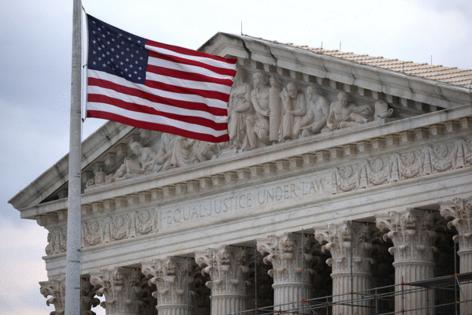Supreme Court clears way for Medicaid cut for Planned Parenthood
Published in News & Features
WASHINGTON — A divided Supreme Court on Thursday ruled that Planned Parenthood and Medicaid patients can’t file a lawsuit to challenge South Carolina’s decision to exclude the health care provider from receiving federal funds because it provides abortions.
The 6-3 decision halts challenges that accuse states of violating the rights of Medicaid recipients to receive care from the doctor of their choice, which advocates from both sides said likely gives states more say over which providers can be included in their Medicaid programs.
John Bursch, counsel for the conservative Alliance Defending Freedom which represented South Carolina in the case, issued a statement that said the decision empowered states to exclude organizations that “profit off abortion and distribute dangerous gender-transition drugs to minors.”
“The American people don’t want their tax dollars propping up the abortion industry,” Bursch said. “The Supreme Court rightly restored the ability of states like South Carolina to steward limited public resources to best serve their citizens.”
The Center for Reproductive Rights, which filed a brief in the case, said the decision would fuel states’ efforts to cut off federal funding for any organization that provides abortion, even when they’re giving essential services like cancer and sexually transmitted infection screenings.
“The Supreme Court overrode what the Medicaid law requires and every patient wants: the ability to choose their trusted health care provider,” the group’s CEO, Nancy Northup, said. “The decision will put fuel on the fire of the multi-year campaign to deny Medicaid patients their right to see Planned Parenthood providers for contraceptives, STI testing, and other non-abortion services.”
Senate Republicans have included in their reconciliation package language that would effectively strip Medicaid funding for abortion provider Planned Parenthood, although it is not yet clear whether it will comply with rules for what can be included without triggering a 60-vote threshold.
Sen. Patty Murray, D-Wash., condemned the decision in a statement Thursday, saying it gave the “green light” for GOP-led states to pull federal funds from providers like Planned Parenthood. Murray signed onto an amicus brief in the case from Congressional Democrats urging the justices to side with Planned Parenthood.
“This decision is devastating for millions of low-income women whose access to birth control, cancer screenings, and other essential health care they receive at Planned Parenthood is now in jeopardy. It is a tremendous blow to women who rely on Medicaid and their ability to see the health care provider of their choosing,” Murray said.
South Carolina first sought to exclude Planned Parenthood from Medicaid reimbursement in 2018, arguing that the provider should not receive family planning or other reimbursement because the group also provides abortions. Planned Parenthood sued.
The majority opinion, written by Justice Neil M. Gorsuch, found that federal law did not allow providers or patients in a state to sue over its decision to exclude a provider.
Gorsuch wrote that while federal law mandates that states provide funding for patients receiving services from “any qualified provider,” that language didn’t bless Planned Parenthood’s lawsuit.
Gorsuch wrote that Congress was not explicit enough in the “any qualified provider” language that states would know that they could face lawsuits as a condition of accepting Medicaid funds.
“Congress knows how to give a grantee clear and unambiguous notice that, if it accepts federal funds, it may face private suits asserting an individual right to choose a medical provider,” Gorsuch said.
Gorsuch wrote that there are still ways to rein in a state that does not comply with Medicaid rules. The Department of Health and Human Services can withhold Medicaid funds more generally, and the law requires that states have their own administrative appeals processes, which Planned Parenthood attempted to use, he wrote.
Gorsuch said that Congress could still change that situation, as “if existing remedies prove insufficient, Congress can create new ones.”
Allowing lawsuits like Planned Parenthood’s would put courts in the position of balancing state decisions, such as spending funds to defend against lawsuits for individual Medicaid recipients rather than providing benefits more broadly.
“And balancing those costs and benefits poses a question of public policy that, under our system of government, only Congress may answer,” Gorsuch wrote.
The decision reversed the U.S. Court of Appeals for the 4th Circuit, which found that Planned Parenthood’s suit could proceed.
Thursday’s decision likely ends Planned Parenthood’s fight for Medicaid funding in South Carolina, as the organization had previously been unsuccessful in a state administrative appeal.
Justice Ketanji Brown Jackson, in a dissent joined by Justices Sonia Sotomayor and Elena Kagan, wrote that Congress enacted the Medicaid Act’s free-choice-of-provider provision to ensure that Medicaid recipients have the right to choose their own doctors.
Jackson wrote the decision thwarted Congress’ tool for Americans to go to court to enforce federal rights and “is likely to result in tangible harm to real people.”
“At a minimum, it will deprive Medicaid recipients in South Carolina of their only meaningful way of enforcing a right that Congress has expressly granted to them,” Jackson said. “And, more concretely, it will strip those South Carolinians — and countless other Medicaid recipients around the country — of a deeply personal freedom: the ‘ability to decide who treats us at our most vulnerable.’”
The case is Medina, Director, South Carolina Department of Health and Human Services v. Planned Parenthood South Atlantic, et al.
©2025 CQ-Roll Call, Inc., All Rights Reserved. Visit cqrollcall.com. Distributed by Tribune Content Agency, LLC.







Comments